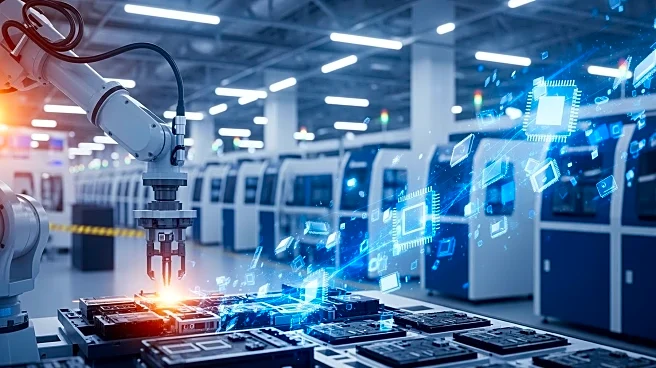What's Happening?
China's Communist Party is set to hold a key plenum from October 20-23 to map out a five-year vision that emphasizes high-tech manufacturing. This move is part of China's strategy to upgrade its industries and project global power as tensions with the
US intensify. The plenum is expected to pledge measures to boost household consumption and address supply-demand imbalances that threaten long-term growth. However, the rivalry with the US complicates Beijing's ability to shift to demand-side policies. Analysts suggest that China's focus on industrial prowess and maintaining the status quo of channeling state resources to producers is a strategic choice in the face of great power competition.
Why It's Important?
The emphasis on high-tech manufacturing reflects China's strategic priorities in the face of US-China tensions. This approach could impact global supply chains, particularly in industries like electric vehicles and solar energy, where China holds significant influence. The focus on manufacturing over services highlights China's intent to secure a strategic high ground in the global tech race. However, this strategy may exacerbate domestic growth imbalances, leading to deflationary pressures and unsustainable debts. The outcome of the plenum could influence China's economic policies and its role in international trade, affecting stakeholders in both the US and China.
What's Next?
Following the plenum, China is expected to continue prioritizing high-tech research and industrial development. The five-year plan will likely emphasize support for manufacturing, with potential implications for trade talks between President Trump and President Xi Jinping. Analysts anticipate incremental focus on social welfare, but decisive reflation remains elusive. The plan may include efforts to stimulate consumption if external demand shrinks enough to threaten growth targets. The evolving economic strategy could lead to shifts in China's domestic policies and its interactions with global markets.
Beyond the Headlines
The plenum's focus on high-tech manufacturing underscores China's long-term strategic goals in the face of geopolitical tensions. The emphasis on production over consumption reflects a typical Marxist approach, prioritizing industrial development as a means of securing global influence. This strategy may lead to challenges in addressing domestic economic imbalances, such as youth unemployment and deflation. The plenum's outcomes could shape China's economic trajectory and its role in the global economy, with potential implications for international relations and trade dynamics.
















